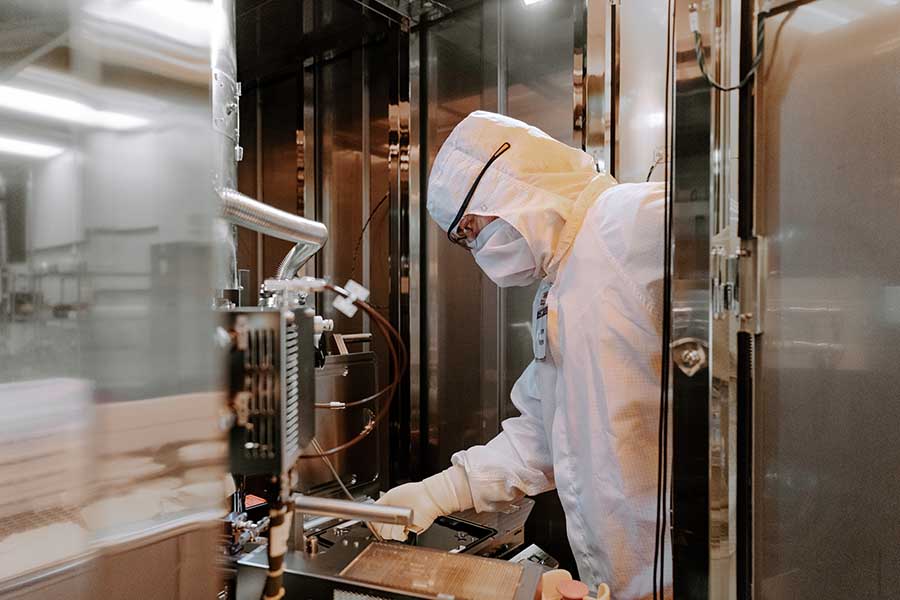Virtual semiconductor fabrication app prepares users for the real thing

The virtual semiconductor fabrication app, vFabLab, is accessible online from any computer or mobile device and is designed to train individuals on semiconductor device fabrication processes and associated equipment before they start working in cleanroom facilities.
Purdue students who trained on the semiconductor fabrication simulator were then able to fabricate real semiconductor components in the cleanroom at Purdue’s Birck Nanotechnology Center.
The students, engineering and computer science majors, were part of a class focused on semiconductor manufacturing taught by Muhammad Hussain, a professor in the Elmore Family School of Electrical and Computer Engineering and associate director of Purdue’s Semiconductor Education program. The students, who ranged from sophomores to graduate students, had one thing in common — none of them had been in, let alone worked in, a cleanroom before.
They reviewed documentation and videos and trained using vFabLab. Then, with a teaching assistant observing, the students used the Birck Nanotechnology Center to successfully fabricate a metal oxide semiconductor capacitor, an integral component of the microprocessors in computers, smartphones and other digital devices.
That experience is one example of how vFabLab dovetails nicely with Purdue’s Comprehensive Semiconductors and Microelectronics Program, which aims, among other things, to begin graduating 1,000 trained semiconductor engineers annually.
Building on an idea
While working on his doctorate, Hussain figures he spent more than 10,000 hours in a cleanroom used for making the semiconductor devices that are at the core of the digital age.
A thought struck him during the experience: Training on cleanroom procedures and equipment could be done in a virtual environment, like a flight simulator for training pilots before they land in an actual cockpit. But Hussain didn’t just think about a cleanroom simulator, he built one.
“If we use this kind of virtualization and then bring the trained people into the physical space, they are far more aware, fully ready and can actually get things done at a very fast pace,” Hussain said.
Disha Maheshwari, a junior in computer engineering, said the experience on vFabLab “gives you the basic idea of what the process is and guides you through the process step-by-step preparing you for actual training in a cleanroom.”
Mrunal Shah, a graduate student working concurrently on a doctorate in applied economics and a master’s in electrical and computer engineering with a concentration in microelectronics and semiconductors, said vFabLab offers a solid grounding in cleanroom procedures.
Shah, whose goal is to work in the semiconductor industry, had a summer internship with GlobalFoundries, one of the world’s leading semiconductor manufacturers. He said his experience with vFabLab and in the cleanroom at Birck made him stand out when he was applying for internships.
“This was super helpful to me because I could tell them I had actually done these processes firsthand,” Shah said. “It definitely distinguished me.”
Maheshwari said vFabLab not only looks like the real thing, but it has at least one advantage over the real thing.
“On vFabLab, there's no time constraint, and you can practice multiple times,” she said.
Hussain, who started developing vFabLab in 2017 and holds a U.S. patent on the technology, brought it with him when he came to Purdue from the University of California, Berkeley in the fall of 2022. By then, the app had an international following — currently more than 1,000 users in more than 110 countries and at more than 120 institutions.
“During the pandemic it became very popular because all the in-person activities paused,” Hussain said. “Many universities adopted it for their courses.”
He has plans to advance the technology and grow the userbase at Purdue and elsewhere.
The next version will run in a 3D headset with users wearing gloves that provide tactile feedback from the virtual environment. He has an idea for deploying the system in public libraries, making the training widely available.
“It’s an opportunity to stretch our imagination when we think about engineering and education,” Hussain said.
About Purdue’s semiconductor-related graduate programs
Purdue's College of Engineering offers two, 100% online semiconductor-related graduate programs: an Interdisciplinary Master of Science in Engineering with a major in microelectronics and semiconductors and a Master of Science in Electrical and Computer Engineering. The latter program is ranked No. 1 nationally by U.S. News & World Report. The online programs are designed for working professionals looking to enhance their skills and careers. They feature the same kind of rigorous curriculum and the same internationally known faculty as on Purdue’s flagship campus. Hussain teaches in both programs.
